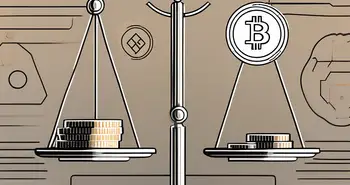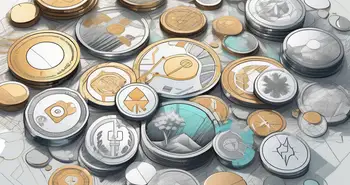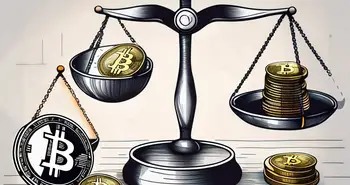Article Contents
Token vs Cryptocurrency: Understanding the Key Differences

As an expert in the field of blockchain technology and digital currencies, I am frequently asked about the differences between tokens and cryptocurrencies. While these terms are often used interchangeably, it is essential to understand their distinctions to navigate the rapidly evolving digital economy effectively. In this article, I will unravel the intricacies of tokens and cryptocurrencies, outline their key differences, explore their impact on the digital economy, and help you make informed decisions about investing in this exciting space.
Defining the Basics: What is a Token?
A token is a digital representation of an asset or a unit of value that is created and managed on a blockchain platform. It is usually built on an existing blockchain network, such as Ethereum or Binance Smart Chain, and can serve various purposes within that ecosystem. Tokens can be of two types: utility tokens and security tokens.
The Role of Tokens in the Blockchain
Tokens play a pivotal role in enabling functionality and operation within a blockchain network. They can be used to access and utilize specific features or services offered by the blockchain platform. For example, in a decentralized finance (DeFi) ecosystem, tokens can be used to provide liquidity, earn rewards, or participate in governance decisions.
Types of Tokens: Utility and Security
Utility tokens are primarily designed for consumptive use within a specific blockchain network. They often grant access to services, products, or specific functionalities. On the other hand, security tokens represent an ownership stake in an entity, such as a company or an investment fund. Security tokens are subject to regulatory compliance and provide investors with traditional rights, such as dividends or voting power.
Unraveling Cryptocurrency: More than just Bitcoin
While most people associate cryptocurrencies with Bitcoin, the first and most well-known cryptocurrency, the landscape has evolved significantly. Cryptocurrencies are digital or virtual currencies that leverage blockchain technology for secure and decentralized transactions.
The Mechanism of Cryptocurrencies
Cryptocurrencies utilize cryptographic technology to secure transactions, control the creation of new units, and verify the transfer of assets. They operate on decentralized networks, ensuring transparency, immutability, and resistance to censorship. Transactions are validated and recorded on the blockchain by network participants, called miners or validators, who are rewarded for their efforts.
The Variety of Cryptocurrencies
Bitcoin, as the pioneer, laid the foundation for cryptocurrencies. However, there are thousands of other cryptocurrencies, each with its unique features and use cases. Some cryptocurrencies, like Ethereum, support the development of decentralized applications (DApps) and smart contracts, enabling automated and self-executing agreements on the blockchain. Others focus on privacy, scalability, or specific industries, such as healthcare or supply chain management.
The Key Differences between Tokens and Cryptocurrencies
While tokens and cryptocurrencies share similarities as digital assets on a blockchain, there are crucial differences that set them apart.
Differences in Purpose and Functionality
Tokens are designed to serve specific purposes within a particular blockchain ecosystem. They provide access to services, incentivize participation, or represent ownership stakes. Cryptocurrencies, on the other hand, primarily function as digital currencies and mediums of exchange. While some cryptocurrencies have additional functionalities, their main purpose is to facilitate transactions.
Differences in Creation and Distribution
The creation and distribution of tokens and cryptocurrencies also differ. Tokens are typically created through initial token offerings (ITOs) or token generation events (TGEs), where developers create and allocate tokens to fundraise for a project. Cryptocurrencies, including Bitcoin, are often mined through complex computations or acquired through digital exchanges.
The Impact of Tokens and Cryptocurrencies on the Digital Economy
Tokens and cryptocurrencies have revolutionized the digital economy, offering unprecedented opportunities for innovation, financial inclusion, and decentralized governance.
Tokens and the Concept of Decentralized Finance
Decentralized finance, or DeFi, has emerged as one of the most significant trends in the blockchain space. DeFi leverages tokens to enable peer-to-peer lending, automated market-making, and yield farming, all without the need for intermediaries. This democratizes access to financial services and empowers individuals to take control of their wealth management.
Cryptocurrencies and the Future of Transactions
The adoption of cryptocurrencies as a medium of exchange is gaining momentum. With their ability to facilitate fast, secure, and borderless transactions, cryptocurrencies have the potential to revolutionize cross-border payments, remittances, and even traditional financial systems. Furthermore, the immutable nature of blockchain technology ensures transparency and reduces the risk of fraud, making transactions more secure.
Making an Informed Decision: Tokens or Cryptocurrencies?
Now that you have a comprehensive understanding of tokens and cryptocurrencies, you may wonder which one is the right choice for you. The answer depends on your goals, risk tolerance, and investment strategy.
Factors to Consider When Investing
When investing in tokens or cryptocurrencies, it is crucial to consider factors such as the project's team, technology, adoption potential, and regulatory compliance. Conduct thorough research, evaluate the whitepaper, and analyze market trends to make informed investment decisions.
Risks and Rewards of Tokens and Cryptocurrencies
While tokens and cryptocurrencies offer exciting opportunities, it is essential to acknowledge the associated risks. Market volatility, regulatory uncertainties, and technological vulnerabilities are some of the challenges investors may encounter. However, with proper risk management and a long-term perspective, the potential rewards can be substantial.
Personal advice from the author:
I have witnessed the extraordinary growth and transformation of the blockchain and cryptocurrency industry since its inception. My personal advice would be to approach this nascent field with due diligence and a willingness to adapt to the fast pace of change. Leverage the knowledge and expertise of reputable sources, join vibrant communities, and explore different projects to find your niche in this exciting digital world.
Frequently Asked Questions (FAQ)
What is the difference between a token and a cryptocurrency?
Tokens are created and managed on existing blockchain platforms and serve specific purposes within a particular ecosystem. Cryptocurrencies, on the other hand, primarily function as digital currencies and mediums of exchange.
How are tokens and cryptocurrencies created?
Tokens are typically created through initial token offerings (ITOs) or token generation events (TGEs), while cryptocurrencies are often mined or acquired through digital exchanges.
What are the risks associated with investing in tokens and cryptocurrencies?
Investing in tokens and cryptocurrencies involves risks such as market volatility, regulatory uncertainties, and technological vulnerabilities. However, with proper risk management and research, potential rewards can be significant.
How can tokens and cryptocurrencies impact the digital economy?
Tokens enable decentralized finance (DeFi) and empower individuals to take control of their financial lives. Cryptocurrencies facilitate fast, secure, and borderless transactions, potentially revolutionizing cross-border payments and traditional financial systems.
What factors should I consider when investing in tokens or cryptocurrencies?
When investing, evaluate the project's team, technology, adoption potential, and regulatory compliance. Conduct thorough research, analyze market trends, and diversify your portfolio to make informed investment decisions.
As you consider the dynamic world of tokens and cryptocurrencies, why not experience the future of trading with Morpher? Our revolutionary platform offers a seamless, fee-free trading environment across a multitude of asset classes, including the very cryptocurrencies and tokens discussed in this article. With Morpher, you can take advantage of fractional investing, short selling without interest fees, and up to 10x leverage to enhance your trading strategies. Embrace the security of a non-custodial wallet and dive into a unique trading experience with Virtual Futures. Ready to transform your investing journey? Sign Up and Get Your Free Sign Up Bonus at Morpher.com today and join the trading revolution.

Disclaimer: All investments involve risk, and the past performance of a security, industry, sector, market, financial product, trading strategy, or individual’s trading does not guarantee future results or returns. Investors are fully responsible for any investment decisions they make. Such decisions should be based solely on an evaluation of their financial circumstances, investment objectives, risk tolerance, and liquidity needs. This post does not constitute investment advice.

Painless trading for everyone
Hundreds of markets all in one place - Apple, Bitcoin, Gold, Watches, NFTs, Sneakers and so much more.

Painless trading for everyone
Hundreds of markets all in one place - Apple, Bitcoin, Gold, Watches, NFTs, Sneakers and so much more.









